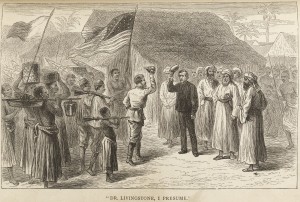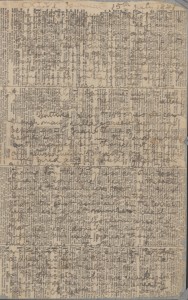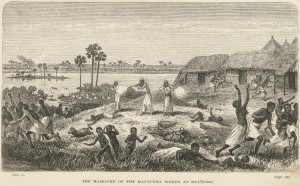 Last year, a team of researchers from UCLA, Indiana University of Pennsylvania and Birkbeck, University of London used spectral imaging to decipher the long-faded letters Dr. David Livingstone wrote with makeshift paper and ink to his friend Horace Waller while he was stranded in the Congo in 1871. Livingstone was low on supplies and had run out of notebooks and iron gall ink by this point. Abed, an Arab trader of slaves and sundries and Livingstone’s right hand man, made him some ink from the seeds of a plant called Zingifure, a brick-red dye the locals used as face paint and cloth dye.
Last year, a team of researchers from UCLA, Indiana University of Pennsylvania and Birkbeck, University of London used spectral imaging to decipher the long-faded letters Dr. David Livingstone wrote with makeshift paper and ink to his friend Horace Waller while he was stranded in the Congo in 1871. Livingstone was low on supplies and had run out of notebooks and iron gall ink by this point. Abed, an Arab trader of slaves and sundries and Livingstone’s right hand man, made him some ink from the seeds of a plant called Zingifure, a brick-red dye the locals used as face paint and cloth dye.
Livingstone created a field diary out of a single eight-page copy of The Standard newspaper and wrote in it using the berry seed ink. The oppressively hot and humid conditions, the delicate natural dye and the forceful news type made the original journal entries fade over time until they became entirely unreadable. When New York Herald reporter Henry Stanley found the long-missing explorer in October of 1871, he supplied him with fresh paper so Livingstone was able to rewrite his journal entries over the next year.
 His rewrites weren’t transcriptions, though. Livingstone left out uncomfortable facts and opinions he had written in his original diary. The prose is self-conscious, reading more like a news article than an in-the-moment description. When Horace Waller published the Last Journals of David Livingstone in 1874, a year after Livingstone’s death, he did a little cleanup of his own to ensure his friend’s reputation as an abolitionist hero and intrepid explorer would remain unsullied by reality.
His rewrites weren’t transcriptions, though. Livingstone left out uncomfortable facts and opinions he had written in his original diary. The prose is self-conscious, reading more like a news article than an in-the-moment description. When Horace Waller published the Last Journals of David Livingstone in 1874, a year after Livingstone’s death, he did a little cleanup of his own to ensure his friend’s reputation as an abolitionist hero and intrepid explorer would remain unsullied by reality.
 It’s only now, after 18 months of painstaking spectral imaging work that we can see the unvarnished words of David Livingstone in the moment. The truth is the intrepid explorer was sick, frustrated, depressed. You know conditions are rough when you look forward to your hemorrhoids bleeding:
It’s only now, after 18 months of painstaking spectral imaging work that we can see the unvarnished words of David Livingstone in the moment. The truth is the intrepid explorer was sick, frustrated, depressed. You know conditions are rough when you look forward to your hemorrhoids bleeding:
When worried by these untoward circumstances the bowels plague me too and discharges of blood relieve headache and are as safety valves to the system which I should not have had if I had allowed Mr Syme to operate on me. Sir Roderick told me that his father was operated upon by the famous John Hunter and died at the early age of forty in consequence. He himself spoiled his saddles when a soldier by frequent discharges from the Piles but would never submit to an operation and he is now eighty years of age.
The abolitionist hero was deeply compromised by his dependence on slave traders to keep him supplied and exploring and had a strongly negative opinion of the manumitted slaves who worked for him.
Livingstone on the freed slaves in his employ:
Confused reports come of the traders [trader’s] men two days distant but on the other side. Have remained two months – though sent for a few days. Went to fight, got between two rivers the bridges of which were cut and several were killed in the water. No dependance can be placed on any one. I refused to send my slaves because they would only add to the confusion and murder. If they go anywhere I must go with them or murder is certain.
 Then there’s the question of the Nyangwe massacre. On 15 July 1871, Livingstone witnessed a massacre of local Africans, most of them women in town for the market, by Arab slave traders from Zanzibar. Stanley carried his re-written account of the massacre back to England where it was published in 1872 to great outcry. Within a year of its publication, the British consul persuaded the Sultan of Zanzibar to shut down the island’s slave market which as East Africa’s main slave-trading port saw 50,000 slaves passing through each year.
Then there’s the question of the Nyangwe massacre. On 15 July 1871, Livingstone witnessed a massacre of local Africans, most of them women in town for the market, by Arab slave traders from Zanzibar. Stanley carried his re-written account of the massacre back to England where it was published in 1872 to great outcry. Within a year of its publication, the British consul persuaded the Sultan of Zanzibar to shut down the island’s slave market which as East Africa’s main slave-trading port saw 50,000 slaves passing through each year.
The account Livingstone wrote in his field diary, however, suggests that his later recreation may have omitted his own questionable behavior and the potential involvement of his men in the massacre.
“Livingstone’s party might have been involved in the massacre,” said Adrian Wisnicki of Indiana University of Pennsylvania, who directed the project. But he advised caution: “We’re only beginning to analyze the evidence.”[…]
The field diary makes clear that Livingstone – an ardent abolitionist – was horrified by the moral character of the freed slaves sent to reinforce his expedition. He describes them as “senseless slaves with no honor.”
In Livingstone’s account, they emerge as rebellious and violent – at one point he confides that “if they go anywhere I must go with them or murder is certain.” In another passage, dated May 18, Livingstone says the slaves have mutinied and bought guns with his money.
Those passages were either sanitized or excised from Livingstone’s 1872 journal. Wisnicki claimed that the edits, combined with discrepancies between the field diary and the journal’s descriptions of the massacre, suggest Livingstone may have had something to hide about the bloody incident.
Livingstone expert Tim Jeal thinks it unlikely that Livingstone, a devout missionary, would have covered up the involvement of his men in the massacre. You can tell from the journal entry that Livingstone was worried he’d be blamed, though. In the days leading up the massacre he writes that the Arab slavers were spreading lies about him being a killer to the locals. Given that he himself described his men (the freed Banian slaves) as undependable, murderous, mutinous and honorless, perhaps the Arab traders weren’t really lying after all.
That’s not to say that Livingstone was involved in any killings personally, but at best he had little control over his employees. There is more than one entry in which he describes his men coming back from a trip talking about all the murders they’d committed.
Livingstone on the massacre at the Nyangwe chitoka (market):
The reports of guns on the other side of Lualaba tell of Dugumbe’s men murdering Kimburu and another for slaves — Manilla is in it again — and it is said that Kimburu gave him 3 slaves to sack the ten villages we saw in flames. He is meeting his doom in spite of mixing blood and giving nine slaves for the operation — Moenemgunga was his victim — & so it goes on making me fear to go with Dugumbe’s people to be partakers in their blood guiltiness. Chitoka about 1500 people came though many villages were burning before us. I saw three of Dugumbe[‘s] people with guns in the market place with wonder but thought it ignorance and retired – when 50 yards off two guns were fired and a general flight took place. Goods thrown away in terror firing on the helpless canoes took place. A long line of heads in the water shewed the numbers that would perish for they could not swim two miles. Shot after shot followed on the terrified fugitives — great numbers died — and a worthless Moslem asserted that all was done by the people of the English. This will spread though the murderers are on the other side plundering and shooting. It is awful – terrible a dreadful world this. As I write shot after shot falls on the fugitives on the other side who are wailing loudly over those they know are already slain. Oh let thy kindom come.
The canoes were all jammed in a creek at the bottom of the market place and the owners could not get them out. Women threw away their produce and scrambled for dear life. Men left their paddles in dread as the merciless fire was rained upon them by other men who must have been cognisant of the plan of Murder. The women soon sank into their watery graves. I counted 33 canoes afloat + 19 still in the creek, one capsized – some overcrowded so as to be logged in the stream without paddles. One long canoe that could have held 30 was occupied by one man who seemed to have lost his head. Others paddled fast to save the sinking till in danger of swamping. No one will ever know how many perished in this bright summer morning.
After the massacre, Livingstone left Nyangwe and made his way back to Ujiji on the shores of Lake Tanganyika. He arrived on October 27th. On October 28th, Stanley found him there.